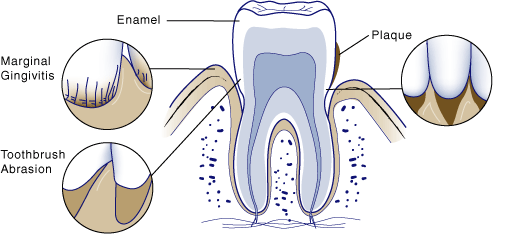Sensitive Teeth: Causes and Treatment
One in three adults suffer from sensitive teeth. When sensitivity affects your teeth, eating experiences that are normally pleasurable can be very painful. Food and drinks that are usually enjoyable – such as hot coffee, steaming home made soup, ice-cold lemonade, or fresh strawberry ice-cream can stimulate a sharp, sudden pain that shoots deep into the nerve endings of your teeth.
If you’ve experienced sensitivity, you know its sensation all too well. What you may not know is that this condition can be prevented or eliminated.
By learning about sensitive teeth, you can make an informed decision about preventive hygiene and appropriate treatments, as well as, bring yourself one step closer to enjoying hot or cold foods and drinks – free of worry.

What Causes Sensitive Teeth?
1. Caries/Abscess
Bacteria begins to destroy the enamel of the tooth making its way to the next layer in, which is dentine. The dentine is directly connected to the pulp of the tooth via little tubules. Once exposed, these fluid-filled tubules conduct hot/cold/sweet sensations to the nerve of the tooth, consequently making the tooth sensitive (see Tooth Decay page).
As the bacteria penetrates further into the tooth it starts to infect and destroy the pulp (nerve) of the tooth. The dying nerve may start becoming very sensitive as the nerves are now completely exposed.
This infection will then continue if not treated, through the tip of the root into the bone causing an abscess. The tooth has now probably progressed from being sensitive to a constant ache.
2. Tartar
Tartar is a hardened substance that adheres to the surface of the tooth. It is made up of several components being bacteria (plaque), saliva and food. The bacterial component destroys the gingiva (gum) causing gingivitis and progresses to destroying the bone holding the tooth causing periodontitis. This exposes the root of the tooth (recession), which is very close to the nerve causing sensitivity.
3. Toothbrush abrasion
People who use a very hard toothbrush or an incorrect brushing technique can destroy the gingiva (gum) around the tooth causing it to recede and expose the root of the tooth. Continuing with your brushing habit can wear away the root surface making the tooth very sensitive.
4. Abfraction
People who grind or clench their teeth (see TMD section) cause the tooth to flex along the gum line. This can cause the gum to recede and start to destroy tooth structure at this point. Combine this with a poor brushing habit, the surface of the root is worn away making the tooth very sensitive.
5. Grinding/Clenching
This habit wears away tooth structure. Also, the constant severe forces placed on the teeth causes the nerve to be over stimulated and consequently very sensitive.
Due to the many causes of sensitivity, we suggest you visit your FirstBite dentist in Essendon to determine the exact nature of sensitivity and the best treatment.
When To See a Dentist at FirstBite?
If you experience persistent tooth sensitivity that disrupts your daily activities, it’s important to seek professional dental care. At FirstBite Dental, we can conduct a thorough examination to identify the causes if sensitivity and recommend you the best treatment for your specific needs. Ignoring sensitive teeth can lead to more severe dental issues such as tooth decay or gum disease. Contact us today and we can help catch these issues early and keep your oral health in check.
Arrange an appointment right now
Start the process of achieving a better smile today by arranging an appointment. Just call us or if out of hours use our simple request a callback from and we will call you back when we are open.
Call 9379 1893
"*" indicates required fields